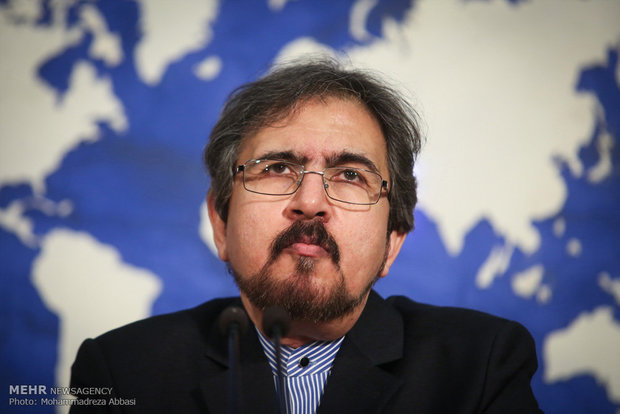Bahram Ghasemi made the remark in his weekly press conference on Monday, adding “our diplomats stationed in Kuwait were not expelled, but their number was reduced.”
“We have always had positive relations with Kuwait, and while their recent move is reproachable, we can still maintain our interactions. Our embassy is still active at the level of ambassador and there is no issue regarding that,” he said.
He went on to add, “Iran reserves the right to a reciprocal measure, if needed. The number of Kuwaiti diplomats in Tehran is not more than the Iranian diplomats in that country.”
On June 20, Kuwait told the Iranian Embassy to reduce its diplomatic staff and close down some of its technical offices following a court ruling last year that implicated some Iranians in a spying case. Following that, Iran's Foreign Ministry summoned Kuwait’s charge d’affaires in Tehran on Thursday to voice protest against the move while rejecting the charges.
About US new sanctions against Iran under the pretext of the country’s missile program and the role of IRGC in region, he said “US moves are not unpredictable, as they have maintained their hostility toward Iran and will not spare any efforts to take similar hostile policies against the Islamic Republic.”
He went on to add, “as of now, the Americans are facing a dilemma: on the one hand, they want to remain committed to their JCPOA-related obligations although this is contrary to Trump’s position during his presidential campaign, and on the other hand, they wish to prevent Iran from benefiting from the nuclear deal.”
“US anti-Iranian measures will bring nothing but regret for them, since Iran has proved to be an independent nation capable of advancing forward without any need for outside help,” Ghasemi stressed.
Ghasemi maintained that US position against Iran’s missile program and IRGC activities is a “strategic mistake” since the issue will never be beneficial to them.
About the possibility of Iran-US cooperation in various fields, Ghasemi said “since nuclear negotiations, we tried to test the US and see if it would be possible to negotiate with the Western country on other issues, but Washington’s lack of commitment to JCPOA has further built up the wall of distrust between us.”
To Mehr News’ question on why Iran has not filed a complaint against US for JCPOA violations, Ghasemi said “we are pursuing all JCPOA-related issues with high seriousness and scrutiny. We have stated our protests about the US lack of commitment at the joint commission’s meetings and will continue to do so. We are hopeful that all sides to the deal will remain committed to their obligations the way Iran has been.”
About Iraqi Kurdistan Region’s decision to hold an independence referendum on September 25, Ghasemi said Kurdistan’s wish for independence will take a long time to be materialized. He said Iran’s position on this issue is the preservation of Iraq’s territorial integrity and national sovereignty; “any decision contrary to this will threaten regional security and stability as it gives foreign actors an opening to intervene in regional affairs and escalate tension,” he added.
MS/4039512
























Your Comment